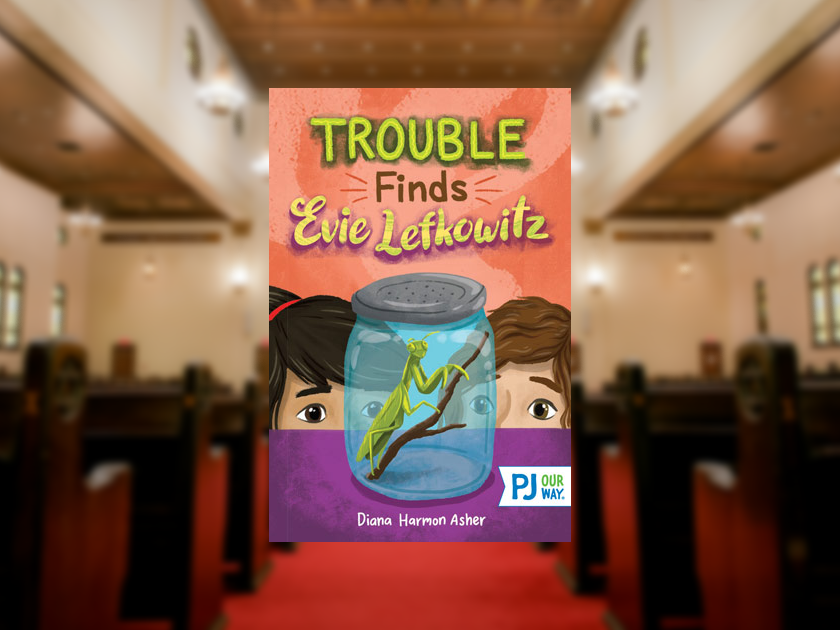Join a community of readers who are committed to Jewish stories
Sign up for JBC’s Nu Reads, a curated selection of Jewish books delivered straight to your door!

When I wrote my first two middle grade novels, Judaism crept in where I didn’t expect it to. In Sidetracked, Grandpa’s kvetching and grepsing became a favorite with young readers, even at the Christian elementary school in Nashville where Sidetracked was an all-school read. In Upstaged, Shira’s Chinese American friend Jason Lee has been to enough bar mitzvahs that he proudly has the first torah blessing memorized.
Creating a Jewish protagonist in my upcoming novel, Trouble Finds Evie Lefkowitz, was a more conscious decision. When the book opens, Evie has lost her father, and is facing the humiliating prospect of her mom dating Mitchell Mitchell, the assistant principal at her middle school. What’s more, she’s been volunteered to tutor Joey Ceraco, a boy she hasn’t spoken to since their playdates in kindergarten — a boy who’s known as trouble.
In an early draft of the story, I made Evie’s father a teacher. But returning to the manuscript a few years later, I realized how much richer the story could be if I delved into the places, tastes, colors, and feelings that made my childhood — and Evie’s — unique. So, I made Evie the cantor’s daughter.
For me, growing up as the cantor’s daughter wasn’t about being devout or even particularly religious. I was a kid, and the temple was my second home. I have happy memories of sliding down the polished chrome banisters in the huge new sanctuary. I knew where they kept the special white High Holiday robes, where the youth group teenagers hung out, and where the teachers stored the dry, swirly ugiyot and warm apple juice we choked down in Hebrew school. I sat with the professional choir — none of them Jewish except my mom — while they heartily enjoyed their Yom Kippur lunch. I knew everyone. Everyone knew me.
For me, growing up as the cantor’s daughter wasn’t about being devout or even particularly religious. I was a kid, and the temple was my second home.
In Trouble Finds Evie Lefkowitz, I had fun with twelve-year-old Evie’s observations of her Jewish world. She rolls her eyes at Temple Shir Shalom’s kitschy “Shabbarbecues” and its newsletter column, “Much Ado About Noshing.” She wonders whether Eliezer at Hebrew school is Elliot or Zachary in the outside world. (Spoiler alert: It’s Liam). But she also finds comfort hiding out in the stained-glass colored light of the old sanctuary, just as I did after my father passed away.
Writing Trouble gave me the opportunity to create a protagonist who is totally Jewish, and totally American. It’s an identity that many of us take for granted (despite the many “American Jew or Jewish American?” youth group debates I attended way back when). But it’s an identity that’s challenged every time someone wants to paint us as “other.” I wanted my readers to know that Evie misses her father as much on Thanksgiving and the Fourth of July as she does at Passover seders and Purim. She’s annoyed by kids who think that because she’s Jewish she might break into a hora at a school dance, but just as disturbed that they think her Japanese American best friend would show up wearing a kimono.
Evie’s a lot like me. But the more personal you get in your writing, the more personal it feels when an editor says no. And many did. I can’t say for sure why. There are hundreds of reasons for “no” in the publishing world. Evie’s story has the same humor, and I hope, the same heart as my earlier books. So, I couldn’t help wondering if the difference might be that Evie’s voice is a Jewish voice. And perhaps some publishers feel that the Jewish American voice has already been heard.
Happily, Trouble Finds Evie Lefkowitz found its home at PJ Publishing. I’m thrilled that Evie will reach so many young Jewish readers through PJ’s extraordinary book club, PJ Our Way. And I’m excited that it will be available to others, outside of the Jewish community. Because just as it’s crucial for all of us to hear the voices of writers of color, Muslim voices, Asian voices, LGBTQ voices, and a thousand different American voices, it’s important for all of them to hear contemporary voices that are completely Jewish, and completely American.
Booksellers and librarians often talk about children’s books as windows and mirrors. I hope Trouble Finds Evie Lefkowitz can be both: A mirror to kids who have experienced a loss like Evie’s, a window to those who haven’t. A mirror to a child who is, like Evie, questioning the labels that are slapped on us too early, a window to a reader who has never met a Jewish American. And for all young readers, I hope it’s a lively, funny story about a girl cherishing old memories and friendships and being open to new ones; a person finding out that dealing with trouble might be a necessary step in growing up.
Diana Harmon Asher is the author of several middle grade novels, including Sidetracked, Upstaged, and the upcoming Trouble Finds Evie Lefkowitz. She grew up in Temple Beth-El of Great Neck, where her father was the cantor. Diana and her husband, Henry, have three grown sons and three very adorable grandsons. They live in Westchester, NY, with frequent visits to their favorite place: Block Island, Rhode Island.